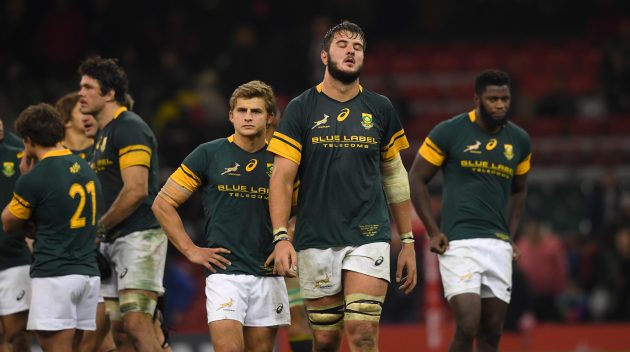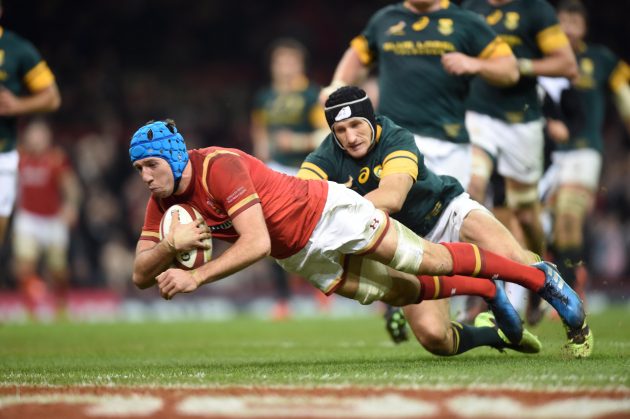Wales secured only their third victory over South Africa in 31 attempts with an improved performance but the Autumn Series could have wide reaching ramifications
‘Warrenball’ is officially dead
Wales beat South Africa by 27-13 in a game in which the ‘Warrenball’ was finally given to the dog to chew on and a new ball brought out of the box. The victory came against a pitiful Springbok team, but it did at least mark the start of a new Welsh gameplan. Gone were the big one up carries in the centre, replaced instead by Dan Biggar’s deft chips over the blitz defence, Scott Williams’ composed distribution and Justin Tipuric’s three dimensional performance at openside. It is no coincidence that Jon Davies, with Scott Williams on his inside, had his best performance of the Series.

Growing into his role: Scott Williams has given Wales different options in midfield
Williams’ triple threat skillset (kick, run and pass) meant that the Bok’s defensive line couldn’t just flood the 12 channel, as you could with ‘Warrenball’, allowing Davies acres in which to roam. He was Wales‘ top carrier and also made three clean breaks. This isn’t to say that Wales avoided the grunt altogether. Ross Moriarty delivered another muscular performance where his carries were so dynamic and obstinate that if he were not tackled he would bore his way through the stadium walls and into Westgate Street. This victory doesn’t make amends for the autumn campaign, but it does at least give some for hope for the coming Six Nations and beyond.
Tipuric finally fits in
Justin Tipuric finally had the opportunity to play for Wales. He has, of course, played for Wales on 45 previous occasions but this was the first time that he has been allowed to really ‘play’ for Wales. Under Warren Gatland’s template Tipuric looked out of place. Whilst his ground work is good, it isn’t his key attribute. His strength lies in his hands and his feet, not in his back. With 16 tackles, a clean break and three defenders beaten, Tipuric delivered a very ‘Southern Hemisphere’ performance where link play and the ability to pass is regarded as a given, not a luxury.

Different class: The Autumn Series has showcased the Wales openside’s skillset
Tipuric’s skillset was evident on numerous occasions, especially when he instinctively chipped turnover ball into space in a matter of milliseconds – he didn’t need to look at a PowerPoint Presentation or glance at coach, he just did it. His interplay with Taulupe Faletau was nothing short of exquisite and his ‘step’ around the Springbok fullback was worthy of a test centre. The Osprey’s openside has had a limited role in the Welsh squad to date but if Wales are committed to changing the way they play, his role will undoubtedly grow.
Ross Moriarty is now undroppable
Few Welsh players have come out of the Autumn Internationals with their reputations enhanced. Moriarty has gone from being ‘an’ option to ‘the’ option. As in the previous tests, whether at eight or six, Moriarty was rarely out of the game for more than 20 seconds. Be it defensively or offensively his contribution was outstanding. But this isn’t the ‘invisible’ work rate that some players are lauded for, his work rate is so in your face that you can barely see the game going on behind him.

Standout autumn: Ross Moriarty has made himself very difficult to drop
Moriarty isn’t one for tackling around the ankles – every tackle leaves a mark on the opposition player that lingers like a nightclub entry hand stamp. Every carry and cleanout is delivered as if it may be his last. And that may be the key to his performances. Whereas others have reputations on which to rely, Moriarty is still forming his – and it looks mightily impressive.
An unrecognisable South Africa
This may be a column about Wales but it is impossible not to comment on the current Springbok team. A stash of French cash added to very understandable social/political factors have left the current Springbok squad almost unrecognisable to those we have witnessed since rugby turned professional. The squad selection smelled of panic and a setup that currently isn’t fit for purpose. There were occasions where it appeared that Allister Coetzee had selected Elton John at outside half, not Elton Jantjies, such was the regularity with which forward passes were being executed in midfield.

Staring into the abyss: The South Africa team has had a woeful year
The once feared forward pack no longer exists, especially when you consider that the starting pack weighed just 881 kgs – way down on the usual 900kg plus packs that the Boks are renowned for. The Boks also failed to make a single linebreak in 80 minutes which is a sad indictment of any elite test team. But by far the most damning demonstration of the current Bok squad is the way that the players returned to the halfway line for a restart in the 47th minute – they looked as if they were walking towards a rectal examination, such was their disinterest. The sport as a whole needs a strong Springbok team, let’s hope it doesn’t take too long.
Embrace the mistakes. Embrace the change
Wales made numerous errors against South Africa, but they shouldn’t be dwelled upon. In order to play expansive rugby errors will be made. Anyone with even a fleeting knowledge of Super Rugby, the Mecca of expansive rugby, will know that exquisite 50 metre tries are interlaced with passes and offloads that didn’t go to hand. And whilst Super Rugby is obviously different to test rugby, the error count is still, and must remain, servile to the try count.

Bulging skillset: Wales need to stick with players who can play what’s in front of them like Liam Williams
If Wales want to compete with the best teams in the world they need to be scoring three to four tries a game. Wings and centres should be selected and judged on their ability to pass and step, not their ability to clean out a ruck in midfield or repeatedly carry the ball four yards. The interplay between Taulupe Faletau and Justin Tipuric shouldn’t be regarded as a rare glimmer of how other teams play, but the norm. This change isn’t just something which only applies to the playing staff, but also the Welsh paying public as a whole. If the Welsh team are to change, it may require a change of attitude from everyone.





